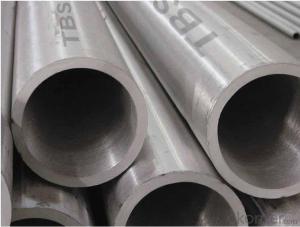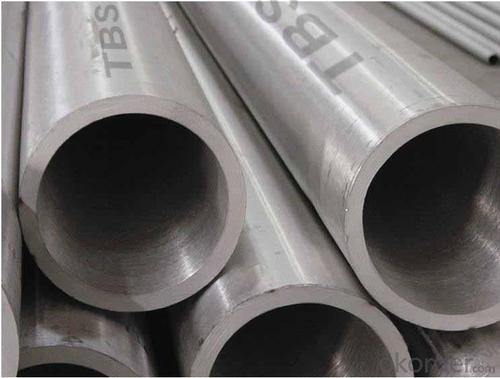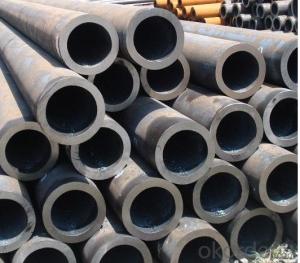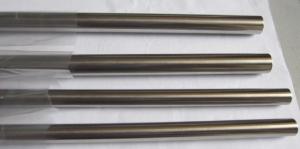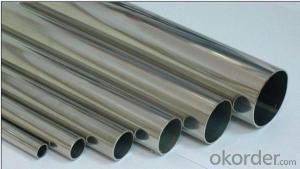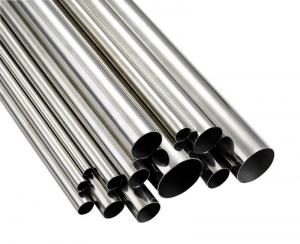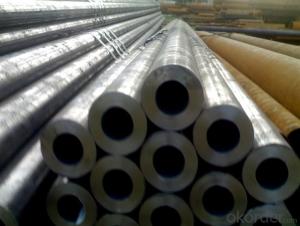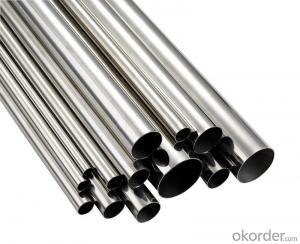P5 Seamless Ferritic Alloy-Steel Pipe for High-Temperature Service
- Loading Port:
- Shanghai
- Payment Terms:
- TT OR LC
- Min Order Qty:
- 1000 kg
- Supply Capability:
- 10000 kg/month
OKorder Service Pledge
OKorder Financial Service
You Might Also Like
ASTM A335 Seamless Alloy-Steel Pipe
Standard: BS 1139, BS 3059-2, JIS G3454-2007
Grade: 10#-45#, 15NiCuMoNb5, 10Cr9Mo1VNb
Detailed introduction to ASTM A335 seamless alloy steel pipe:
ASTM A335 seamless alloy steel pipe
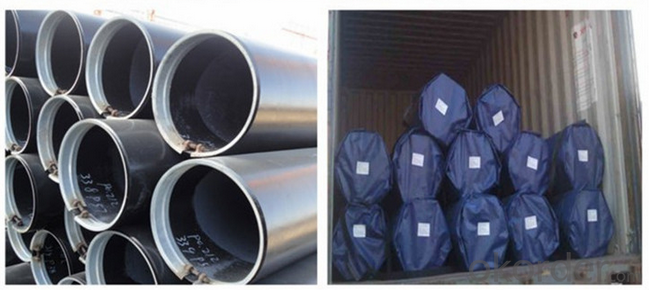
Packaging Detail: | Bundle or Container or as per customers requirement. |
Delivery Detail: | within 25 days after we receive an irrevocable L/Cor 30% deposit |
ASTM A335 Seamless Alloy-Steel Pipe
Standard: BS 1139, BS 3059-2, JIS G3454-2007
Grade: 10#-45#, 15NiCuMoNb5, 10Cr9Mo1VNb
Detailed introduction to ASTM A335 seamless alloy steel pipe:
ASTM A335 seamless alloy steel pipe

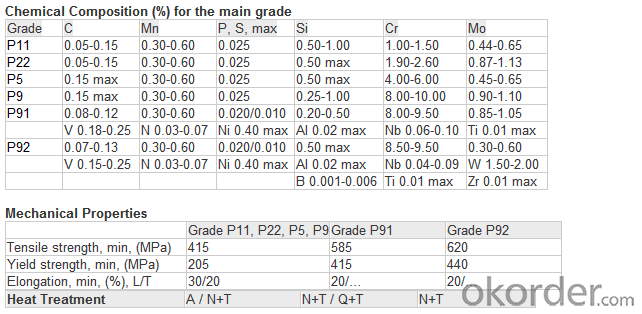
FAQ:
1) why you chose us ?
Professional Manufacturer and supplier of Steel pipe
More than 14 years’ professional producing experience
We can get the lowest ex-factory prices. The price are quite reasonable and it is lower than our commercial peers. also, we can guarantee the qualities of our products.
BV, ISO certificates and SGS test can be provided to assure the quality of our products.
2) Our minimum order quantity:
10 Metric Tons or one 20ft or 40ft Container.
3) How about the Delivery Time?
The steel pipe will be produced since we getting your deposit by T/T or Your original L/C. For normal size, some stocks in our factory now, we can supply once you need.
4)What kind of payment does your company support?
T/T, 100% L/C at sight, Cash, Western Union are all accepted.
5) Do you charge for the samples?
According to our company principle, we just charge for samples, you pay for the freight /courier charge.
6) Main market:
Mid East, South America, Africa, Southeast Asia, India etc
FAQ:
1) why you chose us ?
Professional Manufacturer and supplier of Steel pipe
More than 14 years’ professional producing experience
We can get the lowest ex-factory prices. The price are quite reasonable and it is lower than our commercial peers. also, we can guarantee the qualities of our products.
BV, ISO certificates and SGS test can be provided to assure the quality of our products.
2) Our minimum order quantity:
10 Metric Tons or one 20ft or 40ft Container.
3) How about the Delivery Time?
The steel pipe will be produced since we getting your deposit by T/T or Your original L/C. For normal size, some stocks in our factory now, we can supply once you need.
4)What kind of payment does your company support?
T/T, 100% L/C at sight, Cash, Western Union are all accepted.
5) Do you charge for the samples?
According to our company principle, we just charge for samples, you pay for the freight /courier charge.
6) Main market:
Mid East, South America, Africa, Southeast Asia, India etc
- Q: How do steel pipes compare to ductile iron pipes?
- Steel pipes and ductile iron pipes are utilized in various applications, but they possess distinct differences in terms of their properties and advantages. 1. Strength and Durability: Steel pipes exhibit greater strength and durability compared to ductile iron pipes. Steel possesses a higher tensile strength, making it less susceptible to cracking or breaking under pressure or external forces. Conversely, ductile iron possesses a lower tensile strength but boasts better impact resistance than steel. 2. Corrosion Resistance: Steel pipes are susceptible to corrosion, especially when exposed to moisture or chemicals. Nevertheless, protective measures such as applying coatings or employing corrosion-resistant alloys can safeguard against this. Ductile iron pipes, while inherently more corrosion-resistant than regular cast iron, may still necessitate external protection to prevent rusting and degradation. 3. Flexibility: Ductile iron pipes offer greater flexibility than steel pipes. They can endure certain degrees of bending and deflection without fracturing, making them suitable for applications where ground movement or shifting may occur. Conversely, steel pipes are less flexible and more rigid, rendering them better suited for straight runs or applications with minimal movement. 4. Cost: Generally, ductile iron pipes are more cost-effective than steel pipes. The manufacturing process for ductile iron is easier and cheaper, resulting in lower production costs. However, steel pipes may possess a longer lifespan, requiring fewer replacements over time, thereby offsetting the initial cost difference. 5. Installation: Steel pipes are lighter and easier to handle during installation compared to ductile iron pipes, which can be heavy and bulky. The lighter weight of steel pipes can reduce labor and transportation costs. Moreover, steel pipes can be welded, allowing for more flexible installation options, while ductile iron pipes are typically joined using mechanical couplings or flanged connections. In conclusion, steel pipes offer superior strength and durability, while ductile iron pipes provide better flexibility and cost-effectiveness. The selection between the two depends on the specific requirements of the application, including factors such as corrosion resistance, expected loads, installation conditions, and budget constraints.
- Q: Can steel pipes be recycled?
- Yes, steel pipes can be recycled. Steel is a highly recyclable material and can be used to create new steel products, including pipes, through processes like melting and reshaping. This helps to conserve natural resources, reduce energy consumption, and minimize waste.
- Q: How are steel pipes used in the manufacturing of boilers and heat exchangers?
- Boilers and heat exchangers rely on steel pipes as an essential component due to their exceptional properties and capabilities. These pipes are specifically designed to endure high temperatures, pressures, and corrosive environments, making them highly suitable for these purposes. When constructing boilers, steel pipes are employed to form the main body or shell. This shell contains the water or steam that is heated to generate heat or produce steam for diverse industrial processes. The steel pipes used in boilers are typically seamless or welded, possessing precise dimensions and exceptional strength to ensure structural integrity and prevent any potential leaks. Heat exchangers, on the other hand, are devices used for transferring heat between two fluids, often with varying temperatures. Steel pipes are utilized in heat exchangers as the primary medium for heat transfer. The pipes are commonly arranged in a pattern, allowing the hot fluid to pass through one set of pipes while the cold fluid passes through another set. This arrangement facilitates efficient heat transfer between the two fluids. The use of steel pipes in boilers and heat exchangers provides numerous advantages. Firstly, steel pipes exhibit excellent thermal conductivity, enabling efficient heat transfer between the fluid and the surrounding environment. Secondly, steel pipes possess high tensile strength and can withstand high pressures, ensuring the safety and reliability of the equipment. Thirdly, steel pipes are highly resistant to corrosion, which is crucial in environments where the processed fluids are corrosive or contain impurities. Furthermore, steel pipes can be easily fabricated and customized to meet the specific requirements of boilers and heat exchangers. They can be manufactured in various sizes, lengths, and thicknesses to accommodate diverse applications. Additionally, steel pipes can be coated or lined with materials such as ceramic or epoxy to provide additional protection against corrosion or abrasion. In conclusion, steel pipes play a crucial role in the manufacturing of boilers and heat exchangers. Their exceptional properties, including high strength, thermal conductivity, and corrosion resistance, make them the optimal choice for these applications. The use of steel pipes ensures the efficient operation, safety, and longevity of boilers and heat exchangers in various industrial processes.
- Q: Can steel pipes be used for mining applications?
- Yes, steel pipes can be used for mining applications. Steel pipes are commonly used in the mining industry for various purposes. They are often used for transporting fluids, such as water or slurry, in mining operations. Steel pipes are known for their durability, strength, and resistance to corrosion, making them suitable for underground mining environments where conditions can be harsh and corrosive. They can withstand high pressure and are able to handle the heavy loads associated with mining applications. Additionally, steel pipes can be easily welded and connected, allowing for efficient installation and maintenance. Overall, steel pipes are a reliable and cost-effective choice for mining applications.
- Q: What is the difference between steel pipe and copper pipe?
- The composition and properties of steel pipe and copper pipe are what set them apart. Steel pipe is made from carbon steel, an alloy of iron and carbon, while copper pipe is made from naturally occurring copper. Durability is a key distinction. Steel pipe is renowned for its strength and resilience, making it suitable for high-pressure situations and harsh environments. It is highly resistant to corrosion, ensuring its longevity. On the other hand, copper pipe is prized for its malleability and ease of installation. It is not as durable as steel and can corrode over time, particularly when exposed to certain chemicals or aggressive water conditions. Another difference lies in thermal conductivity. Copper pipe is an exceptional heat conductor, making it perfect for applications requiring efficient heat transfer, such as plumbing systems for hot water supply. Conversely, steel pipe has lower thermal conductivity compared to copper, which may affect its performance in specific applications. Cost is also an important factor. Copper pipe tends to be pricier due to the higher cost of copper as a raw material. Moreover, installing copper pipe necessitates specialized tools and techniques, which can increase overall expenses. Conversely, steel pipe is often more cost-effective and easier to work with, making it a popular choice for various applications. In conclusion, the primary discrepancies between steel pipe and copper pipe encompass their composition, durability, thermal conductivity, and cost. Each type possesses its own advantages and disadvantages, and the selection between them hinges on the specific requirements of the given application.
- Q: Can steel pipes be used for transporting gases?
- Yes, steel pipes can be used for transporting gases. Steel pipes are known for their strength, durability, and resistance to corrosion, making them an ideal choice for transporting various gases over long distances. Additionally, steel pipes can handle high pressure and extreme temperatures, ensuring the safe and efficient transportation of gases.
- Q: What is the lifespan of galvanized steel pipes?
- The lifespan of galvanized steel pipes can vary depending on several factors such as the quality of the galvanizing process, the environment in which they are installed, and how well they are maintained. However, on average, galvanized steel pipes can last between 40 to 70 years before they may start to show signs of corrosion or degradation.
- Q: What are the different types of coatings used on steel pipes?
- There are several types of coatings that are commonly used on steel pipes to enhance their durability and protect them from corrosion. Some of the most common types of coatings include: 1. Fusion-Bonded Epoxy (FBE) Coating: This coating is applied to the steel pipe through a process of heating and melting the epoxy powder, which then fuses to the surface. FBE coatings provide excellent corrosion resistance and are commonly used in water pipelines and oil and gas industries. 2. Polyethylene (PE) Coating: PE coatings are applied to steel pipes using a similar process as FBE coatings. PE coatings provide a protective layer that is resistant to moisture, chemicals, and abrasion. They are commonly used in gas pipelines and underground water pipelines. 3. Polypropylene (PP) Coating: PP coatings are similar to PE coatings in terms of their application process and protective qualities. However, PP coatings offer enhanced resistance to higher temperatures, making them suitable for applications such as chemical processing plants and refineries. 4. Concrete Weight Coating (CWC): CWC is a special coating that involves applying a layer of concrete to the steel pipe. This coating provides additional weight to the pipe, making it more stable and resistant to buoyancy in underwater or submerged applications. 5. Zinc Coating: Zinc coatings, such as hot-dip galvanizing, involve immersing the steel pipe in a bath of molten zinc. This process creates a protective layer of zinc on the surface of the pipe, offering excellent corrosion resistance. Zinc coatings are commonly used in outdoor applications, such as fencing, guardrails, and water pipelines. 6. Bituminous Coating: Bituminous coatings involve applying a layer of bitumen or asphalt to the steel pipe. This coating provides excellent resistance to water and chemicals, making it suitable for underground pipelines and structures. These are just a few examples of the different types of coatings used on steel pipes. The choice of coating depends on factors such as the intended application, environmental conditions, and the level of corrosion resistance required.
- Q: How are steel pipes repaired if they develop leaks?
- Steel pipes can be repaired if they develop leaks through various methods such as welding, clamping, or using epoxy compounds. The specific repair technique depends on the size and location of the leak as well as the type of pipe, and it is typically carried out by trained professionals with the necessary equipment and expertise.
- Q: What are the factors to consider when selecting steel pipes?
- Some factors to consider when selecting steel pipes include the intended application and environment, the required strength and durability, the size and thickness of the pipes, the corrosion resistance, the cost, and the availability of different types of steel pipes.
Send your message to us
P5 Seamless Ferritic Alloy-Steel Pipe for High-Temperature Service
- Loading Port:
- Shanghai
- Payment Terms:
- TT OR LC
- Min Order Qty:
- 1000 kg
- Supply Capability:
- 10000 kg/month
OKorder Service Pledge
OKorder Financial Service
Similar products
Hot products
Hot Searches
Related keywords
